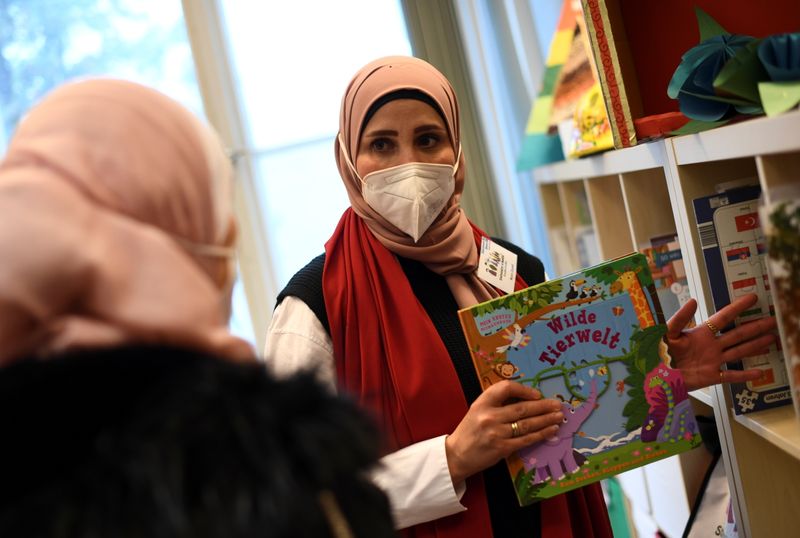By Joseph Nasr
BERLIN (Reuters) - When a teacher told Syrian mother Um Wajih that her 9-year-old son's German had deteriorated during his Berlin school's six-week shutdown, she was saddened but not surprised.
"Wajih had picked up German fast, and we were very proud of him," said the 25-year-old mother of two.
"I knew that without practice he would forget what he had learned but I couldn't help him."
Her son now faces another year in a 'welcome class' for migrant children until his German is good enough to join native peers at a school in Berlin's poor neighbourhood of Neukoelln.
School closures - which in Germany have amounted to around 30 weeks since March last year compared to just 11 in France - have further widened the educational gap between migrant and native pupils in Germany, amongst the highest in the industrialised world.
Even before the pandemic the drop-out rate among migrants stood at 18.2%, almost three times the national average.
Closing that gap is crucial, otherwise it risks derailing Germany's efforts to integrate more than two million people who applied for asylum in the past seven years, mainly from Syria, Iraq and Afghanistan, experts say.
German language skills and maintaining them - are critical.
"The biggest impact of the pandemic on integration is the sudden lack of contact with Germans," said Thomas Liebig of the OECD, a Paris-based grouping of industrialised countries. "Most migrant children don't speak German at home so contact with natives is crucial."
More than 50% of pupils born in Germany to migrant parents don't speak German at home, the highest rate in the 37-member OECD and compared with 35% in France. The figure rises to 85% among pupils not born in Germany.
Migrant parents who may lack academic and German language skills have sometimes struggled to help children with home schooling and to catch up on lost learning. They have also had to contend with more frequent school closures as they often live in poorer areas with higher COVID-19 infection rates.
Chancellor Angela Merkel's government and the leaders of Germany's 16 states, which run local education policy, chose to close schools during each of the three coronavirus waves while keeping factories open to protect the economy.
"The pandemic amplified migrants' problems," said Muna Naddaf, who leads an advice project for migrant mothers run by the Evangelical Church's charitable arm Diakonie in Neukoelln.
"They suddenly had to deal with more bureaucracy like administering coronavirus tests on their child or arranging a vaccination appointment. There is a lot of confusion. We've had people ask us if it is true that drinking fresh ginger tea protects against the virus and if vaccination causes infertility."
Naddaf connected Um Wajih with Noor Zayed, an Arab-German mother and mentor, who advised her on how to keep her son and daughter active and stimulated during lockdowns.
Long-running flaws in Germany's education system like weak digital infrastructure that hampered online teaching and short school days which left parents having to pick up the slack, compounded the problems for migrants.
'LOST GENERATION'
Only 45% of the 40,000 schools in Germany had fast internet before the pandemic, according to the Teachers Union, and schools are open until 1.30 pm compared with at least until 3.30 pm in France.
Schools in poorer neighbourhoods more likely lacked digital infrastructure and parents couldn't afford laptops or after-school care.
Between 2000 and 2013 Germany had managed to halve migrant school dropouts to about 10% by boosting language assistance in nurseries and schools. But drop-outs have crept up in recent years as more pupils from countries with lower educational standards like Syria, Afghanistan, Iraq, and Sudan joined German classrooms.

The Teachers Union says that 20% of the 10.9 million pupils in Germany need additional tutoring to successfully complete this school year and the total number of drop-outs is expected to double to more than 100,000.
"The educational gap between migrants and natives will grow," said Prof. Axel Pluennecke of the Cologne Institute for Economic Research. "We are going to need massive investments in education after the pandemic, including targeted tutoring, to avoid a lost generation of pupils."